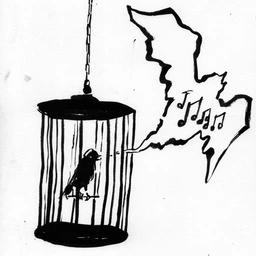Was just trying to explain to someone why everything is going to shit, specifically companies, and realized, I don’t fully get it either.
I’ve got the following explanation. The sentences marked with “???” are were I’m lost. Anyone mind telling me, if they’re correct and if so, why?
The past few years, central banks were giving out interest rates of 0% or even negative percentages. Regular banks would not quite pass this on, but you could still loan money and give it back later with no real interest payments.
This lead to lots of people investing in companies. As long as those companies paid out more money than those low interest rates, it was worthwhile. But at the same time, this meant companies didn’t have to be profitable, because they could pay out investors from money that other investors gave them???
This has stopped being the case, as central banks are hiking interest rates again, to combat inflation???
Literally money. More specifically, the financial need under a capitalist system for businesses to constantly grow and increase profits, and to focus on shareholder profits over making a good product. Most businesses on any sort of large scale today aren’t in it to do a good job at making whatever it is they make, they’re in it to make money. Their actual ‘business’ is just an incidental stop on the way to making more money.
You see this literally everywhere. Remember Odwalla? They made these great, super-thick bottled smoothy-like juices. Easily the healthiest thing you could find to drink in most of the places they were sold. Then Coca-Cola bought them out, changed the name to Naked Juice, and watered them all down. What we have now, as a result, is a pale imitation of what we once had.
Why? Because Odwalla was profitable, so it was profitable for Coca-cola to buy up a competitor for shelf space. But once they were bought up, there’s no incentive to deliver the same quality of product. They have no remaining competition, so they can release a shittier version and we’ll basically just suck it up because it’s still healthier than soda.
Our reward for worshiping currency is for everything ever made out of love of a craft or an art to be exploited and turned into a shittier version of itself.
The solution, to my reckoning, is to start making things you love because you love to make them and to refuse to sell out when they come knocking.
There’s only one thing I would alter in your statement. You said:
…and to focus on shareholder profits over making a good product.
I would say, "and to focus on shareholder profits over
making a good productanything else, including life itself.It’s more profitable for a health insurance company to deny someone’s claim than to pay for their healthcare in the US. The insurance company won’t care if that ultimately leads to the person’s death - they have to answer to their shareholders.
It’s more profitable for Nestlé or Google to siphon water from countries in the global South than it is to have sustainable practices that don’t exacerbate climate change. So what if that means that millions of people will die in the years to come? That’s their problem for being poor.
We need to bring about the kind of change that has politicians recognize that there is more to human life than a dollar amount, and that poverty is not a moral failing on the part of the individual. But until that happens, poverty is akin to a death sentence.
Ok but what you are asking is to crash the market, that will lead to more harm than good. Any better less drastic idea?
If the market can’t survive without being detrimental to human life on a large scale, it deserves to crash.
Sounds exactly what an evil super villain would say.
Is it evil to prioritize human life over the state of the market?
Is it good to prioritize the economy over human lives?
I wouls just add that it’s all about making profits and increasing them year per year, but always focusing on the short term. To the CEOs, shareholders and other directives, it doesn’t matter if the company goes bankrupt 10 years from now, as long as they suck in all the profits they can now.
Even if the company is very successful, with a very good product(s) and they could just go into easy-ride mode continuing to provide those products. They only want to make as much money as quickly as possible and once they get their hands on the company, the enshitification for the sake of quick profits ensues.
This is why I feel bad about any company releasing their “best product ever”, because it’s all downhill from there. The only thing left for the shareholders to do is cut costs, worsening the product.
The solution, to my reckoning, is to start making things you love because you love to make them and to refuse to sell out when they come knocking.
I mean, sure, that will solve some things. Not climate change, though. I think we can aim for a little higher, but when I say that perhaps seeking infinite growth in a finite planet might lead to an environmental catastrophe that’s somehow controversial.
Human greed is infinite.
That’s why Elon musk wants to go to Mars. The galaxy is virtually infinite.
Odwala and Naked are different companies. Odwalla was bought by Coca Cola and then closed in 2020. I think full sail bought it and is reopening it. Naked was started in my hometown and eventually bought by Tropicana, still up and running.
Ohhhh Naked is watered down Odwalla. Can’t believe I never made that connection but it all makes sense now. Used to love Odwalla, kind of like Naked if I missed lunch or something
It boils down to companies only trading on their value and not paying a dividend. Without a dividend, a company has to grow to provide value to its shareholders - with a dividend a shareholder would profit simply from the company making money.
See also: craft brewing
Almost every single time.
I have a couple of important exceptions but I dare not mention them by name lest they be bought and ruined tomorrow.
If they don’t get bought out, they’ll go the way of Anchor, I fear…
Anchor happened because Sapporo bought them.
Oh wow I had no idea.
Seems the employees may re-open as a co-op, thus making my above comment even more incorrect
What you describe is the basic structure in our economy that drives this, but the answer to why the enshittification has been accelerating, is technology. Advances in technology, particularly information technology, progressively enable corporations to be more efficient at all this, including more efficient at gaming the political system and manipulating users and customers.
If you look back nostalgically at some time decades ago when things were less bad, it’s because things were less efficient and humanity was more likely to sometimes get in the way of the machine that we’ve built having it’s way with us.
deleted by creator
Thank you for the nostalgia blast.
I do remember loving odwalla, specifically the carrot juice. But this was more than a decade ago, when I was still in high school.
Never remember them rebranding as naked juice. Although I do remember picking up naked juice on two separate occasions wondering how the taste would be. Two times was enough to learn the taste wasn’t worth the price.
deleted by creator
Long answer is read Marx, understand how capitalism leads to monopoly, monopoly leads to price gouging and collusion to prevent competition, and poverty exists because wealthy people suck up all the capital from a society. Imagine a billion dollars. That’s a thousand million. Then hundreds of billions by 20 people.
We’re in late stage capitalism and the enshittification is accelerating.
Cory Doctorow (pluralistic.net) has a number of stories now on the concept of “enshittification”. Basically businesses start off being good to customers but eventually get to a point where, if they’re dominant the drive for endless profit results in them turning to squeezing suppliers, customers, everyone.
Tech enables new forms of exploitation.
And the bad economics right now enforce simultaneous enshittification in a huge amount of products. I guess that might also be a big point to why it’s so apparent right now.
There’s got to be a more scholarly name for that trend which has existed long before the invention of the word “enshitification”. What is it?
Degradation
Is capitalism dying or will it just get more and more ruthless until like 10 people have 99.999% of the wealth? Is there a difference? Either way it seems like humanity will have to make a choice soon whether we want to keep propping up a system that has fundamentally failed them.
Laissez-faire economics and libertarian ideals (a-la Atles Shrugged) destroy society. I don’t know that anyone has nailed down a good balance of personal liberty, social justice, and (individual) wealth; I suspect one of the nordic models is closest, but fuck if I know.
What I’m pretty sure of is that countries with laissez-faire models are like virulent diseases. They’re aggressive and successful, until they kill the host and collape. To compete, other countries have to adopt similar models. I think the host in this metaphor is the planet, but we’re seeing some indication that the social immune system in the US is responding, with a resurgence on union activity. And it’s possible that one of nature’s balancing tools (diseases such as COVID, SARS, etc) will help with the environmental impact; I don’t see that as a global community we’re doing so well at managing our environmental resources responsibly, so if nature doesn’t cause a great purge, we may simply extinct ourselves and moot the issue.
Edit: Whilst I’m preaching… I believe capitalism is the best economic system we’ve found. I believe some tools in capitalism have unintended, and deleterious consequences. In particular, the stock market, and usury. Both are tools that generate money directly from money (“investing” and “interest”), and both IMHO are responsible for most of the excesses of capitalism.
Nordic models are a mix of social democracy and corporatism. Definitely not free and definitely not the answer.
Here is an alternative Piped link(s): https://piped.video/piwpkQh_YvI
Piped is a privacy-respecting open-source alternative frontend to YouTube.
I’m open-source, check me out at GitHub.
Cause 1% of people own 99% of everything. That’s never going to not be a shitty situation.
But also shit has been bad for marginalised groups since like forever. Now we’re all just getting a taste of that as our masters pull the ladder up from under them.
Most of these businesses operated at near unsustainable levels with almost negligible interest rates on loans, and now they’re panicking because their business model is shit and they’re trying to recover however they can by enshittifying everything.
I think it’s cultural. An entire generation has now been raised to believe that capitalism is inherently oppressive. Therefore they unconsciously or consciously believe that they must oppress their customers as part of the money-making ritual. And since capitalism doesn’t inherently produce that oppression, they have to add it in the form of products getting worse.
It’s cyclical and it’s been happening for thousands of years. It’s part of our human nature.
We all work together and build systems, societies and civilizations and do great things. We become wealthy and then slowly concentrate that wealth to smaller and smaller groups of people. Eventually the majority of the wealth is controlled by a very small group of people and everyone else has nothing. The system at this point can not sustain itself and collapses. Then the whole human system restarts again from the bottom.
It’s happened many many times throughout human history.
We are just at the height of one of those cycles.
Maybe this can change in the software space with the advent of foss.
It kinda is I suppose, even if very, very slowly.
What exactly do you mean by system collapsing and restarting? How does it look?
Oooh! I got this one! There’s an excellent YouTube channel called “Fall of Civilizations” that show all the different ways this happened in the past.
deleted by creator
Thanks for the… explanation, but I think you’ve had enough alcohol or whatever you take.
deleted by creator
You’re welcome you rude piece of shit.
I think the overall picture is accurate, wealth typically concentrates in good times, and spreads out in bad ones. However, we in the West are still nowhere near the all-time highs of inequality, and while it’s cyclic it’s not in a predictable way like that. I don’t think it’s even clear that highly unequal societies must become unstable.
The trouble is that we can’t apply the same speed of development or collapse to our civilization as to those in the past.
We have nuclear weapons, mass communications, global internet and interconnected multinational financial systems that all work at real time speed all across the world at the mass level and individual level.
We are capable of developing in so many ways at such great speed compared to the past … but we are also capable to destroying ourselves instantly through nuclear warfare, or within a century through our ignorance of climate change.
Yeah, technology is really different. Ideology is also new; agricultural civilisation had versions of feudalism for thousands of years until the American and French revolutions, and it seems like they’ve actually made a huge difference in how things go. It’s pretty much the sole reason I think we could break the cycle.
Entropy. Plain and simple.
Theres something about the human mind as we take more shits throughout the years everything starts to hear, look, smell, taste and feel more and more like shit as the time passes.
Which perfectly explains why my greatnana who lived to be 100 thought it was absolutely hilarious that she shat herself when she tried to blow out her candles on her birthday cake.
Zero interest rates meant that speculative investing (for the purpose of selling later for more money, not for any dividends a company might pay from any profits) with lent money (aka leveraged investment) was pretty much a risk free proposition since loans with zeto interest rates cost no money to maintain. (You and me don’t have easy access to loans for investing from the money markets but the kind of investor we’re talking here does)
Interest rates go up and that lent money now has significant costs associated so investing with lent money (and nowadays that is most of investing done at professional levels) now has to produce enough returns to pay the interest on the loans hence all the pressure for companies to generate profits.
(Note that money from the money markets is typically on much shorter terms - and loans usually are rolled-over into new loans on maturity - than consumer loans, so interest rates on those respond much faster to changing base interest rates than for consumer loans)
(Also the companies themselves also have loans that they now need to pay interest on, which adds a more direct pressure to start having a positive cashflow)
As for central banks raising base interest rates to combat inflation, the idea is to literally make people have less money available (I kid you not: people are supposed to be made poorer) so that they don’t buy as much, and that reduction in Demand will cause prices to fall.
Edit: I was thinking about this and realised I had moved the ??? around but not clarified it all. Specifically, how do we go from “speculative investors having less cost-free money” to “companies which have eternally been in ‘investment phase’ (i.e. losing money whilst promising they’ll one day be the greatest thing since sliced bread) being forced into trying to actually have profits”. Well, for the stock price not to fall too much (which might lead to a rush-to-the-exits, a feeback-cycle were the more money that exits the less the worth of the stock, so the more money exits) and as speculative investors are fewer and/or have less money to invest, they have to appeal to more traditional investors, the kind that judges a company’s worth by their (stock-)Price-to-Earnings ratios (which, by the way, is a ratio that the smaller it is the more appealing a stock is to buy), so to have good P/E ratios without the Price side going down, the Earnings (basically Profit) side has to go up, hence the need to generate some profit (notice that the P/E of a company without profits is INFINITY), which is what pushed them to try and come up with profit NOW to hold their valuations and sometimes even at the cost of future profitability.
This also links with another element I forgot to mention early: the “climb up the yield scale”. In simple terms (as much as possible) - most of the money out there not in the hands of States is owned by two kinds of entities - Pension Funds and the Rich (which, given the extremelly uneven distribution of money actually own more money than everybody else combined) - and they’re not just putting it on a bank and getting Savings Account interest on it, they’re looking for ways to make money from money. Now, back in 2010 when Central Banks “rescued” the Economy through their Zero Interest Rates Policy, that money which was mainly parked in the safest of investments (Treasuries, Investment Grade Corporate Bonds) started getting puny amounts of interest, eventually even losing value (remember how the Treasuries of many countries started having a negative yield - i.e. you paid those countries money to hold your money?!) so they started going up into riskier and riskier asset classes seeking a higher yield (i.e. higher returns on their investments), up and up into Junk Bonds, Stocks, Realestate, Tech Stocks, Startups and even really exotic asset classes like digital “coins” (I very much doubt there would ever have been a Bitcoin mania without all that money seeking yield due to ZIRP), all of which is the “climb up the yield scale”.
Now the “climb up the yield scale” sounds like the opposite of what would make companies which are mainly speculative investments try to make profits because it is exactly that: the rise of baseline interest rates reverses that trend - it makes safe financial assets more appealing (holding Treasuries now actually pays interest, not cost interest, and just up the risk scale investment grade corporate bonds also pay more) which is pulling all that money down (remember, rich people and pension funds: they’re usually quite averse to losing money, i.e. more risk averse that, say, Investment Banks, especially old-wealth) and out from the higher-risk and more speculative investment classes, noteably Startups (and further down Tech Stocks and even Realestate). This again puts pressure on companies which were so far profitless to produce profits: it makes them look safer hence retain some of the investment which had before climbed the yield scale when the safest of investments had ridiculously low (even negative) returns.
There are actually yet more ways through which higher interest rates feed into speculative companies trying to put on a pretty face by actually having profits, but this post is more than long enough already ;)
I personally think that everything has always gone to shit. But in the downfall, new things will take over until that goes to shit. Or maybe because there are new things the old things will go down.
Take the example of video stores. They used the be the best thing ever. Rent all the movies you would like to see for a small fee per movie. Then downloading and streaming came along. Streaming was cheaper and more convenient. Result: video renting business went to shit.
Then the streaming services started to raise their prices. It started going to shit. Soon new ideas/companies/services will swoop in and the cycle will repeat again.
Yip. Everything is always going to shit, but manure makes good fertilizer.
That is an awesome sentence. I will use that one some time.
So just to answer the parts that didn’t make sense to you…
Basically, interest rates were so low that investors would throw huge sums of money at companies that might one day pay off huge (called moonshots. Basically, everyone wanted a piece of the next google.)
This was fine because with low interest rates, there weren’t secure guaranteed other investments those investors could be making.
But now, investors can, fairly safely, put their money into t bills (basically, lending it to government which is traditionally exceptionally safe) and get a decent return.
So investors are ready to pull their money out unless they see some sort of return. Hence, a site like reddit is now trying desperately to monetize so as to turn a profit or to go public, sell shares and reward the initial investors.
The central banks bit… Typically, the way to fight inflation is to slow the economy down by raising interest rates. When interest rates are high, it costs more to borrow so it’s harder to get capital to start a business, grow business etc which slows the economy and, in theory, slows inflation.
Happy to clarify!
Thanks! I guess, I posed this question badly as most of the other folks came here to philosophize or rant.
If you’re doing those moonshots and a company isn’t profitable, does that mean you don’t get paid out in the meantime? You just keep your money in there, because the company’s valuation rises, which makes your x% company ownership worth more, right?
Right, and with inflation, we just need to slow it, i.e. stretch it over a longer period of time, because we have automatic processes in place to adjust for a certain rate of inflation over a fixed period of time (like for example work contracts that include an automatic pay raise every year).
I guess, I posed this question badly as most of the other folks came here to philosophize or rant.
Not really, that’s just how this place is.
Well, part of posing it badly was to post it to AskLemmy, because yeah, this is more just an opinion community. I probably should’ve gone to some finance-related community, but couldn’t think of one, off the top of my head…
does that mean you don’t get paid out in the meantime?
Usually, yup. Investment deal structure varies but generally that’s the case. You can sometimes borrow money to buy out an original investor, which is what I think what part of your earlier explanation bit meant.
Right, and with inflation, we just need to slow it, i.e. stretch it over a longer period of time
Basically, yeah. We kind of just accept there will be some degree of inflation… I don’t recall any arguments as to why zero inflation would be bad but I think inflation’s existenxe is just a fact of economic life. So we want to spread it out in an orderly fashion so those processes you correctly listed can quietly do their thing.
I think as we get older we just notice more and more. Things are bad but relatively things are also good. Take the bad and the good. Others here are explaining the economy stuff, that explains housing and our tech woes, blah blah blah
Stay informed, fight the good fights, but also take the small moments to stop and think about the positives in your life too. Your family, friends, what you find solace in. There are a lot of negative things, and social media really likes to focus on the negatives, but remember your personal positives too.
Everyone giving you simple one-word explenation is most probably wrong.
“that’s capitalism” is the new “the devil did that”
This is like reprimanding every weather effect as immediately climate-relevant (‘but it rains’, ‘winter exists’). Whole empires shattered because of over-simplification and maladaptation, visible in the knowledge display of some contemporary heirs and politicians.
Worldwide economic growth is coming to a halt and what we’re seeing is the ripples it causes.
The tail end of this ripple is large corporations death grip on increased profits every quarter. But the reality is that at some point you can not successfully grow profits past the peak without destroying everything. We are in the initial phase of the destruction onslaught.
This sounds most right to me. Apple, at times the most valuable company on the planet, had to introduce a “services” category to keep Wall Street happy (because they still need growth). That’s where enshitification happens.
It’s not enough to make a ton of money. You have to show that you’ll make even more tomorrow. The knock-on effect is that everything keeps getting worse for customers. This is the end result of our financial system.
The problem is that money is permited to generate money. So the more you have beyond the threshold to sustain yourself the more you can generate without labour. The business with no interest loans accelerates things but it isn’t the problem. It is that the system rewards idle investors at the expense of those whose labour actually generates value.
Capitalism wasn’t fine until someone broke it. The core concepts behind it are flawed.
I’ve said this plenty of times but it bears repeating, the problem isn’t capitalism or the type of social structure, the problem is people. Capitalism is a simplistic and ultimately ineffective solution, because it doesn’t account for the human problem.
People will always try to game the system. We need a system that recognises and accounts for that.
But capitalism is so much easier to game than, for example, market socialism.
But at the same time, this meant companies didn’t have to be profitable, because they could pay out investors from money that other investors gave them???
Few, if any, of the big tech companies were playing out any kind of dividend to investors. It was more that they were content for companies to maybe someday make money as opposed to actually making money,
That assumes dividends are the way stock players make money, which is, to put it rudely, boomer thinking. The company doesn’t need to pay you a dividend if your stock goes up 30% YOY because of your ‘infinite growth’, you get your money from selling the stock. This is why the markets are so fucked, because the big trading algorithms that drive day to day trading push companies to overextend and in some cases believe the lie that is infinite growth so their short term investors can reap rewards over a few weeks, then move on to the next company, leaving the first one holding the bag for their own actions.
Doesn’t help when companies that resist this trend suffer from activist investors that use their media influence to say that a long running company is ‘suffering’ when it really is just consistently growing slowly and safely. Pushing for restructures and endless inflation. It’s the 80s all over again, just rebranded.




















